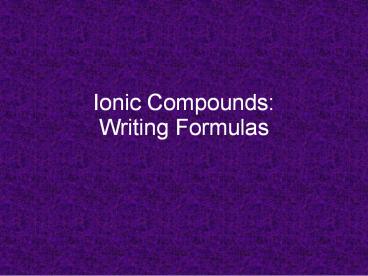Ionic Compounds: Writing Formulas - PowerPoint PPT Presentation
Title:
Ionic Compounds: Writing Formulas
Description:
Ionic Compounds: Writing Formulas Empirical Formulas formulas with smallest whole-number ratio of elements in compound ionic compounds are ONLY written as empirical ... – PowerPoint PPT presentation
Number of Views:160
Avg rating:3.0/5.0
Title: Ionic Compounds: Writing Formulas
1
Ionic CompoundsWriting Formulas
2
Empirical Formulas
- formulas with smallest whole-number ratio of
elements in compound - ionic compounds are ONLY written as empirical
formulas
3
Identify Formulas ? empirical vs molecular ?
ionic
- H2O
- H2O2
- CaF2
- NaCl
- CH4
- C2H6
- NiO
- FeCl3
empirical NOT ionic
molecular NOT ionic
empirical, ionic
empirical, ionic
empirical NOT ionic
molecular NOT ionic
empirical, ionic
empirical, ionic
4
Formula Unit
- simplest ratio of ions in ionic compound
- examples
- KBr is formula unit
- K1 ions Br-1 ions in 1-to-1 ratio
- AlCl3 is formula unit
- Al3 Cl-1 ions in 1-to-3 ratio
5
Binary Ionic Compounds
- composed of two different elements
- since ionic composed of
- () monatomic metal ion
- (-) monatomic non-metal ion
note binary compound may contain more than
2 ions but only 2 kinds of ions (ex
Al2O3)
6
Oxidation Number or State
- charge of monatomic ion
- (right superscript)
- some elements form only 1 ion
- some elements can form more than 1 ion
7
Oxidation States
- A group metal elements
- group 1 ions always 1
- group 2 ions always 2
- MOST group 13 ions are 3
- groups 14, 15, 16 have multiple () oxidation
states - B group metal elements (transition metals)
- can have more than 1 oxidation state
- but are always ()
8
Writing Formulas for Binary Ionic Compounds
- first rule in writing formulas
- POSITIVE ION FIRST
how get the subscripts?
start by writing formulas from the ions
9
- reminder compounds are electrically neutral
therefore - sum of ALL charges in compound
- MUST be equal to zero
- () and (-) charges must each other
10
Equal but Opposite Charges
- ions formula
- Na1 and Cl-1 NaCl 1 (-1) 0
- Mg2 and O-2 MgO 2 (-2) 0
- Al3 and P-3 AlP 3 (-3) 0
- rule write symbols, () FIRST!
11
try a few formulas
- Li1 and I-1
- Ca2 and O-2
- Al3 and N-3
- K1 and F-1
- Ba2 and S-2
LiI
CaO
AlN
KF
BaS
12
Criss-Cross Method
- charges opposite but NOT equal
- Mg2 and Cl-1, CROSS and DROP!
- ( only, forget
signs!)
- Mg1Cl2 (if subscript is 1, forget it!)
MgCl2
13
Check the Math
- MgCl2 means 1 Mg2 and 2 Cl-1
- (1)(2) (2)(-1) 2 -2 0
- charges MUST add up to zero!
14
try these
- Ca2 Cl-1
- Na1 O-2
- Cs1 S-2
- Al3 Cl-1
- Al3 Se-2
- Mg2 F-1
- K1 N-3
CaCl2
Na2O
Cs2S
AlCl3
Al2Se3
MgF2
K3N
15
of course, it gets more difficult
- potassium (K) and fluorine (F)
- zinc (Zn) and iodine (I)
- sodium (Na) and oxygen (O)
- aluminum (Al) and oxygen (O)
- silver (Ag) and sulfur (S)
KF
ZnI2
Na2O
Al2O3
Ag2S
16
and more challenging
- gold 1 and fluorine
- gold 3 and fluorine
- titanium 2 and oxygen
- titanium 3 and oxygen
- titanium 4 and oxygen
- manganese 4 and bromine
- manganese 7 and bromine
AuF
AuF3
TiO
Ti2O3
Ti2O4
?
Ti O2
MnBr4
MnBr7
17
POLYATOMIC IONS
- Table E groups of covalently bonded atoms that
have a charge () or () - polyatomic ions have names
- (-) polyatomic ions can form ionic bonds with ()
metal ion
18
Ternary Compounds
- contain 3 or more different elements
- contain polyatomic ions
- ()metal ions can bond to () polyatomic ions
- () polyatomic ions bond to something (-) charged
- either (-) non-metal ion or (-) poly ion
19
Formulas with Polyatomics
- Whats the formula for the compound formed from
Al3 and (SCN)-1? - charges must add up to zero
- write symbols, positive first!
- figure out how many of each ion needed
Al(SCN)3
20
ions with equal but opposite charges are easiest
- Na1 and (OH)-1
- K 1 and (HCO3)-1
- Mg2 and (CO3)-2
- Li 1 and (NO3)-1
- Ca2 and (SO4)-2
Na(OH)
- K(HCO3)
- Mg(CO3)
- Li(NO3)
- Ca(SO4)
21
these are more challenging
- Mg2 and (PO4)-3
- Al3 and (NO3)-1
- Fe2 and (OH)-1
- Hg22 and (SCN)-1
- Mg2 and (HCO3)-1
- Al3 and (C2O4)-2
Mg3(PO4)2
Al(NO3)3
Fe(OH)2
Hg2(SCN)2
Mg(HCO3)2
Al2(C2O4)3
22
even more challenging
- zinc nitrate ion
- magnesium hydroxide ion
- lithium carbonate ion
- potassium sulfate ion
- calcium phosphate ion
- beryllium chlorate ion
Zn(NO3)2
Mg(OH)2
- Li2(CO3)
- K2(SO4)
Ca3(PO4)2
Be (ClO3)2































